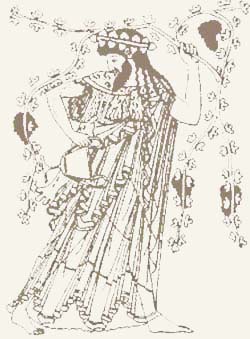
AT HOME here are writers speaking in a style more conversational than studied for an audience who might be seated on a front porch at night watching fireflies create random small rays to light up the listening, or in the dining room of an ancient inn with lamps and perhaps a hearth fire to kindle community.
It takes only one or two steps of the imagination to move through the dusk to the dining room at the inn or the porch of a house or, by daylight, to a backyard garden for picking grapes and for gossiping, a verbal mode associated with the term grapevine. We say, I heard it on the grapevine, referring to rumor, advance news of interest to the community, sometimes scandal, always a dramatic story or piece of a story, circulating, making the rounds, lingering on the surface even when it suggests hidden things.
Gossip is a varietal narrative to be cultivated for its piquancies. But art, like soul, yearns for depths. This round of The Grapevine focuses on human nature in search of or unwittingly finding the extraordinary experience.
In the Patrick O'Brian novels about sea captain Jack Aubrey and ship's surgeon Steven Maturin, part of the comedy is in the clumsiness each man exhibits when out of his element. Jack, when on land, often gets into trouble, to the point once of being sentenced to the pillory. By sea, Steven has difficulty telling starboard from larboard, fore from aft, but he is revered among the sailors for his skill at surgery, having successfully trepanned one of them right before their eyes. For those of you who don't know the procedure, it involves cutting and peeling back the scalp, drilling a hole in the skull, treating the brain, and replacing the skullpiece with a metal plate--in this instance, fashioned from a hammered coin). And on land, Steven has a practical mind that sometimes seems wholly absent from Jack. However, when Jack is in his element, the sea, he is wholly in charge, more than competent, and sometimes, as we see him through Steven's eyes, filled with "more than common life."
I have taken that phrase as our theme for this issue of The Grapevine. In Jack Aubrey's case, it refers to the intensification of his life force when he comes to meet a challenge that he knows will require and use all that he is. He becomes physically transfigured, looming larger, blooming with readiness. The Melanesians had a word for such a force: mana, a radiance that comes of being perfectly attuned to the visible world and the invisible, animating force behind it.
The transfiguration often happens to Jack just before he goes into battle. We are told that men at war often feel such an upsurgence of energy. We hear from General Patton how he loves war more than his life, from General Lee how it is a good thing that war is so terrible, else we should grow too fond of it. I heard from my first boss, a retired CIC colonel, that if it weren't for the killing, he would like always to be at war.
I am not suggesting that war is the only condition that brings about the experience of being filled with ?more than common life.? There are other catalysts, like sex and art and mystical vision, by which we become rapt out of our ordinariness. But facing death brings a quickening of life that makes one wonder whether mindfulness of death is not what makes it possible for humans to live intensely.
One room of the site is the salon in which presentations are going on. Another is a reading gallery for exploring parallel worlds in art and mythology. A third contains a miscellany of items meant to enlarge the ongoing theme of this symposium: what it means to be human.
The SALON presents a variety of storytellers and image makers and thinkers, from promising beginners to seasoned artists of mature and full-bodied talents.
The Grapevine Art & Soul Salon welcomes comments from visitors. Use the Contact button to send e-mails that will be forwarded to appropriate persons.